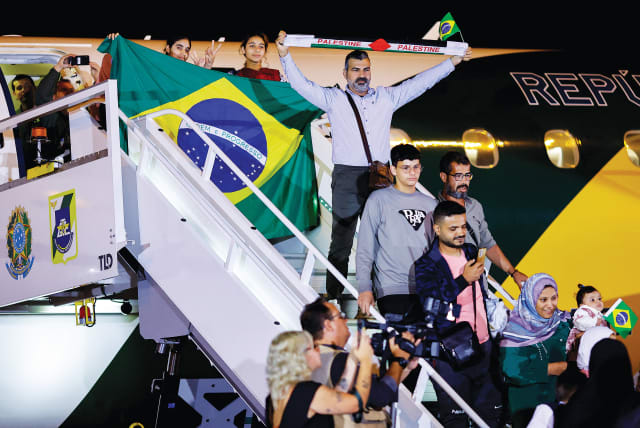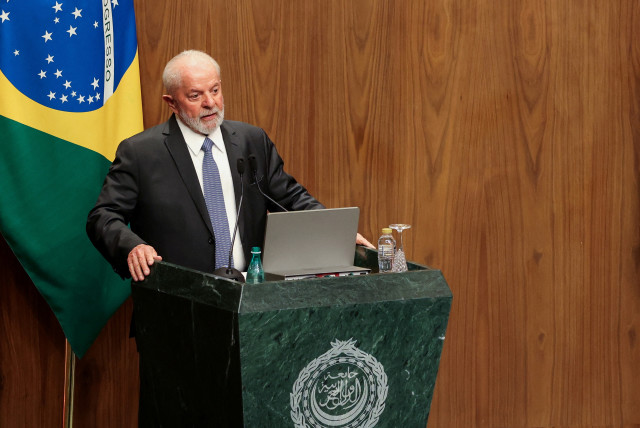Over 80% of Brazilians take issue with Lula's anti-Israel comment

Foreign affairs: Andre Lajst, executive director of StandWithUS Brazil, said that Lula’s Holocaust comments were sharply criticized in Brazilian media, and also in left-wing circles inside Brazil.
Everyone knew it was just a matter of time.
Everyone knew that given left-wing Brazilian President Luiz Inácio Lula da Silva’s pro-Palestinian past, the anti-Israel aides surrounding him (including his wife and top adviser Celso Amorim), his ambitions to lead the global south, and his ties to Iran, it was just a matter of time before he would say something outrageous about the current war in Gaza.
After all, this is a man who donned a keffiyeh and laid a wreath at the tomb of Yasser Arafat in 2010 in Ramallah while refusing to visit the grave of Theodor Herzl in Jerusalem during the same trip. It is also the same man who recalled Brazil’s ambassador to Israel in 2014 during Operation Protective Edge, leading then-Foreign Ministry spokesman Yigal Palmor to memorably quip that Brazil was “an economic and cultural giant” but a “diplomatic dwarf.”
On Sunday, while attending an African Union summit in Ethiopia, Lula exceeded all expectations, not just blasting Israel as expected but sounding as though he had suddenly morphed into Turkish President Recep Tayyip Erdogan.
“What is happening in the Gaza Strip with the Palestinian people has no parallel in other historical moments. In fact, it did exist when Hitler decided to kill the Jews,” he said. “It’s not a war of soldiers against soldiers. It’s a war between a highly prepared army and women and children.”
The blowback from Israel was swift and fierce. Prime Minister Benjamin Netanyahu termed Lula’s comments “Shameful and grave,” and said they amounted to “Holocaust trivialization and an attempt to harm the Jewish people and the right of Israel to defend itself.”
The next day, Foreign Minister Israel Katz summoned Brazil’s ambassador, Frederico Meyer, for a reprimand, but not in the Foreign Ministry, as is usually done, but, rather, at Yad Vashem. There, he said that Israel will “neither forget nor forgive” Lula’s comments.
Speaking in Hebrew, without a translator, Katz told the ambassador in front of the cameras, “I brought you to a place that testifies more than anything else to what the Nazis and Hitler did to the Jews, including members of my family. The comparison between Israel’s just war against Hamas and the atrocities of Hitler and the Nazis is a disgrace and a severe antisemitic attack.”
Katz continued: “In my name, and in the name of all Israeli citizens, tell President Lula that he is persona non grata in Israel until he retracts his statements.”
The next day, Brazil responded not by apologizing but by recalling Meyer for consultations.
Then, just like that, Israeli-Brazilian relations, which soared under former right-wing president Jair Bolsonaro, plummeted to a new low.
Brazilian people disagree with Lula's comments
Interestingly, however, the Brazilian public is not following its leader.
A CNN Brasil poll on Monday found that eight of 10 Brazilians – or 83% of those polled – took issue with Lula’s comparison.
This dovetails with what one senior diplomatic official said in Jerusalem: “There is a gap in Brazil between the government and the public, with the public more supportive of Israel than the government, and this shows up in polls and in parliamentary debates.”
The CNN Brasil poll, for instance, found that 57% of the 800 respondents thought that Israel is on the right side in this conflict, while 28% sided with Hamas. Additionally, 26% said that Brazil should support Israel in this war, another 14% said the Palestinians, while 54% said the country should stay neutral – something Lula’s government is not doing. In the first two months after the war, support for Israel, as evident in various polls, was running at between 70% and 80%.
This is interesting because it stands in contrast to the situation in some European countries, where the governments – which understand the challenges Israel faces in fighting a terrorist organization in an urban landscape – are more supportive of Israel than the public, which is often overly swayed by the daily pictures of suffering inside Gaza and unable to consider the broader context.
Dina Siegel Vann, director of the American Jewish Committee’s Arthur and Rochelle Belfer Institute for Latino and Latin American Affairs, said this phenomenon of the public being more supportive of Israel than the government is not unique to Brazil.
“This is a phenomenon we are seeing more and more in Latin America,” she said in a telephone interview from Maryland, pointing particularly to Chile and Colombia. Chile has a left-wing president, Gabriel Boric, who is unabashedly pro-Palestinian, but who is facing backlash from elites in the country who want to see that state – which has the largest Palestinian community outside of the Middle East, but also a tiny but influential Jewish community – take a more nuanced and balanced approach to the conflict.
She also placed Colombia in this category. This country also has a hard-left president, Gustavo Petro, a former member of a Colombian terrorist organization, whose anti-Israel rhetoric has been strident and jarring, considering that until his election in 2022, Colombia was considered one of Israel’s closest allies in Latin America.
There, too, she said, public opinion is much more supportive of Israel than is the government.
She said Petro, the first left-wing president in Colombia’s history, is an anomaly and that “Colombia has been a friend of the US, of Israel, and the Jewish people forever,” something she predicted will return when Petro’s presidential reign ends.
In Brazil, Siegel Vann said, Israel is not much of an issue, except within the Evangelical community, which makes up about 30% of the massive country’s population.
“It is not like in the United States, where Israel is an issue of domestic interest and is constantly in the public square. In Brazil, Israel becomes an issue only when there is a crisis in the Middle East,” she said.
During the right-wing tenure of Bolsonaro, Israel became a part of the highly polarized domestic debate: since Bolsonaro was such a strong supporter of Israel, supporting Israel was identified as support for him. Israel was “weaponized” as part of a much larger domestic and polarizing political debate, she said, drawing parallels to what is happening in certain circles in the US.
Siegel Vann said that Lula’s comments in Ethiopia appeared to be an effort to “pander to his base. Remember, he wants to be the leader of the south-south nonaligned movement, to become the leader of those countries that see themselves as anti-US, and trying to create a new global configuration and alignment.” She noted that Brazil, along with Colombia and Chile, supported South Africa’s genocide case against Israel at the International Court of Justice in The Hague.
Since the outbreak of the war, according to Andre Lajst, the executive director of StandWithUS Brazil, Lula met a couple of times with the Palestinian Authority representative in Brazil and the PA’s foreign minister in Ethiopia, getting a one-sided view of the events.
Lajst noted that in the immediate aftermath of October 7, Brazil sent planes to retrieve Brazilians in Israel at the time, including Brazilian Israelis who were interested in returning to Brazil. In addition, Lula worked as well to extract Palestinians with Brazilian passports living in Gaza.
“He went to the airport in Brasilia, the capital, to receive and to greet the Palestinian residents that came back to Brazil, but not the Israeli residents,” Lajst said.
Lajst said that Lula’s Holocaust comments were sharply criticized in the Brazilian media, and also in left-wing circles inside the country.
Asked about whether Lula cares that his comments and positions are causing a great deal of consternation in Israel and among Brazil’s Jews, he said the Brazilian president would care if he sees that even those in the Democratic Left in Brazil and elsewhere are criticizing him. The issue came up in a “frank” meeting with visiting US Secretary of State Antony Blinken, who a State Department spokesman said made clear that “we don’t agree with those comments.”
Lajst said that just as there was criticism of Lula’s statement in the Brazilian media, there was also criticism of Katz’s angry and undiplomatic response. Regarding whether Lula will send the ambassador back to Israel, Lajst said not to expect this to happen anytime soon.
“I don’t think they’re going to break off relations, like Venezuela once did,” Lajst said. “It is not in Brazil’s national interest. Brazil has a very big and important relationship with the US and with all the countries in Europe. There are also more than 100,000 Jews here. That would be catastrophic for Brazil.”
He speculated that the government would wait until after the war, or perhaps until after elections in Israel, to return the ambassador.
According to Lajst, speaking from Sao Paulo, Brazil’s Jews have been anxiously watching a rise in antisemitism since October 7.
“Security [for Jewish institutions] was increased in many situations,” he said. “People are taking proper precautionary measures to be more safe. There were some attacks in the streets, graffiti on the walls of synagogues.”
While there have been some pro-Palestinian protests, he said that it has been nothing like the demonstrations that have rocked cities in Europe and the US since October 7.
He said Lula’s recent outburst, however, gives a tailwind to extremists on the far Left to call Israel the new Nazis.
“When you do that, when you call Israel the new Nazis, the Hitler of today, then it needs to be destroyed. So Lula is aligning himself with all those that want to destroy Israel: Hamas, Hezbollah, the Taliban,” he said, adding that this could lead to an increased motivation to carry out antisemitic attacks inside Brazil.
Siegel Vann said that leaders of the local Jewish community met with Foreign Minister Mauro Vieira several weeks ago, expressing concerns that every time government officials made strident comments about the situation in Israel, the level of antisemitism in the country would rise. She said antisemitic incidents in Brazil are up 1,000% since October 7.
According to Siegel Vann, Vieira was told that “it is very important for the president and others to be aware of their comments, because it [the rhetoric] was having an effect on the well-being of the Jewish community.”
That meeting was held before Lula’s antisemitic outburst this week. “Obviously,” she said, that meeting “didn’t work.”
This is the fourth installment in a series on Israel’s standing in the world as a result of the current war.
Jerusalem Post Store
`; document.getElementById("linkPremium").innerHTML = cont; var divWithLink = document.getElementById("premium-link"); if (divWithLink !== null && divWithLink !== 'undefined') { divWithLink.style.border = "solid 1px #cb0f3e"; divWithLink.style.textAlign = "center"; divWithLink.style.marginBottom = "15px"; divWithLink.style.marginTop = "15px"; divWithLink.style.width = "100%"; divWithLink.style.backgroundColor = "#122952"; divWithLink.style.color = "#ffffff"; divWithLink.style.lineHeight = "1.5"; } } (function (v, i) { });

